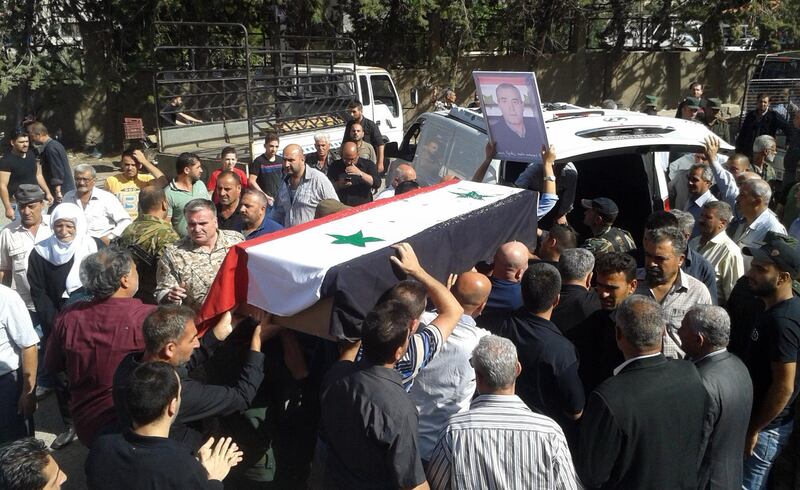The Syrian army launched an offensive against the last pocket of ISIS territory in the country’s south early on Monday, after the extremist group executed a teenage student it kidnapped last month.
Syrian and Russian jets began striking ISIS positions in the Badiya desert, east of the Druze city of Sweida, before ground forces advanced 11 kilometres into the barren terrain.
The offensive came days after ISIS executed 19-year-old Muhanad Thouqan Abou Ammar, who was among 30 people kidnapped by the group on July 25 in a brutal assault on Sweida and the surrounding villages. The attack left more than 250 dead and sent shock waves through the country’s 700,000-strong Druze community.
Since then, ISIS has been trying to use the hostages — mostly women and children — as bargaining chips to secure concessions from the government, according to people familiar with the negotiations. Talks were initially carried out by local Druze leaders but have been taken over by the Syrian government and its ally Russia.
The student’s death was announced on Sunday. His family were sent a video of his execution by the kidnappers.
Families of the remaining hostages are agonising over their fate after negotiations broke down last week.
"Some support the offensive but the majority are concerned about the risk to their family,” said Nour Radwan, a journalist and resident of Sweida.
While exact details are unclear, the negotiations are centred on the exchange of dozens of ISIS fighters held by the government for the kidnapped women and children.
Locals said last week that a convoy of ISIS fighters had been given safe passage from Deraa to Badiya as part of a deal to release the hostages. But talks appear to have faltered.
Previous deals to free hostages have involved the relocation of ISIS fighters to other areas but the militants have run out of places to escape to in the south. With the offensive now under way, some are fearing the worst.
"ISIS has stopped communicating with the families," said Mr Radwan.
____________
Read more:
Syria's Kurds prepare for a future without the US
Divided and marginalised — how Syria's war split occupied Golan Heights
____________
In a last-ditch effort for a solution, the Kurdish-led Syrian Democratic Forces have since offered to exchange some of the hundreds of ISIS fighters it holds in its custody in exchange for the Druze women and children.
A statement released on Sunday by the group said it was ready for "any swapping operation of our detained Daesh members for the sake of freeing the kidnapped and returning them to their families".
The province of Sweida had been largely shielded from the civil war until the July 25 attack.
Many Druze men refused conscription into the Syrian army and locals had set up their own checkpoints in the city.
But ISIS fighters had been gathering strength in the Badiya desert — a vast and empty stretch of land to the east of Sweida. Their numbers were bolstered in May by bus loads of ISIS members and their families who were given safe passage from Damascus.
Before the offensive began on Sunday, some residents of Sweida expressed concern that another attack might follow.
"Of course we are afraid of a second attack but we are ready,” said Mustafa Baraki. “This is a tight-knit community.”
With its assault on Badiya, the Syrian government is looking to add to a string of victories in recent weeks in the south. Last week it captured the last area of Deraa province, and it is now close to controlling all of southern Syria.
Those victories have freed up significant manpower for the Syrian army, which is turning its attention to its next campaign — the rebel-held province of Idlib in the north.
The province is home to 2.5 million people, of whom only about half are natives – the rest are displaced from other parts of the country. With the area surrounded by government forces and the border with Turkey closed, the UN has warned that military action would result in a humanitarian catastrophe.
About 60 per cent of the province is controlled by an Islamist alliance led by a Syrian former Al Qaeda affiliate. Turkey, which provides support to the other rebel groups in the province, and has its own troops stationed there, has been in talks with Russia to fend off an attack.
Despite Russian assurances that an attack is not imminent, President Bashar Al Assad said last month that Idlib was the government’s next priority.
"More than anywhere else in the country, Idlib's status as opposition-held territory arguably poses the biggest immediate threat to regime stability, given its proximity both to Russia's military headquarters and to the coastal heartlands," Charles Lister, a senior fellow at the Middle East Institute, told The National. "There's just no way Assad can allow that opposition and jihadi bastion to remain sitting there forever — a military campaign just seems inevitable now.
“The question ahead is how it takes place, particularly given Turkey’s substantial investment in the north-west, and its clear declaration that it represents a red line.”
As uncertainty over the offensive looms, the UK-based Syrian Observatory for Human Rights said there had been "an upsurge in security chaos and mutual assassinations between rebel groups" in the province.
The head of the Observatory, Rami Abdel Rahman, told AFP that Turkish-backed rebels had arrested 45 people on Sunday for "attempts to reconcile with regime forces" and for attending "meetings with its intelligence services".





